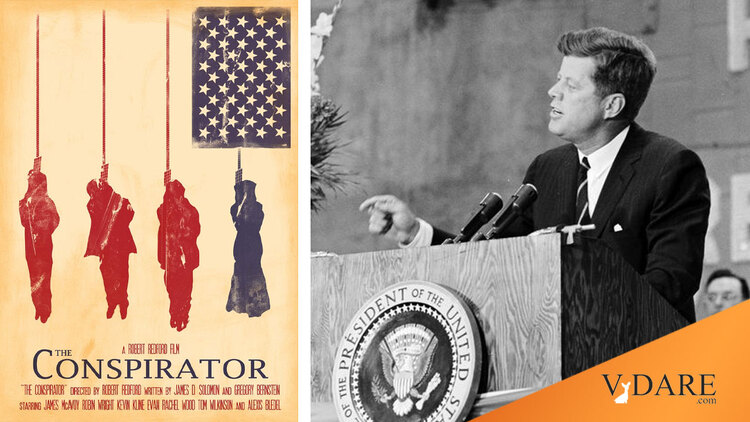
JFK and Robert Redford on Reconstruction
By Steve Sailer
08/29/2023
Earlier: How Was American Race History Taught In 1968?
From my 2011 review in Taki’s of Robert Redford’s movie The Conspirator:
Robert Redford’s courtroom drama The Conspirator recounts the 1865 trial by a military tribunal of Confederate partisan Mary Surratt for her murky role in John Wilkes Booth’s plot to murder Abraham Lincoln. Redford obviously intends his movie as a parable denouncing George W. Bush’s employment of military tribunals instead of jury trials for Guantanamo Bay prisoners … .
Still, The Conspirator is of considerable interest, both for its cast’s quality and because the 74-year-old Redford seems to have no idea how unfashionable his view of post-Civil War history has become since he arrived on the New York stage in the late 1950s. The Conspirator reflects the anti-Republican prejudice endemic in history textbooks when Redford was in school. To imply that 21st-century Republicans are deluded by Islamophobia, Redford argues that 1865’s Republicans were crazed by Confederophobia.
Oops. …
Everyone says history is written by the victors, but it’s actually written by the historiographers. For the first century after 1865, white Southerners wrote most Civil War histories and almost all the accounts of the subsequent Reconstruction. Their anger over the postwar military occupation was transmitted in two vastly popular movies: 1915’s The Birth of a Nation and 1939’s Gone with the Wind. After FDR’s 1932 victory, white Southerners made up a large fraction of the New Deal coalition. Hence, the liberal Democrats who wrote most mid-century history books pandered to the South’s view of Reconstruction as a grave injustice. …
With heavy irony, Redford implies that the true conspirator was not poor Mrs. Surratt but Secretary of War Edwin Stanton (played by the imposing Kevin Kline as a Cheney-Rumsfeld evil authoritarian). In The Conspirator, Stanton railroads through the trial of eight civilians by military judges. (Historically speaking, new President Andrew Johnson, a Tennessee Democrat, seems to have been more convinced of Mrs. Surratt’s guilt than Stanton was.)
Stanton, tireless organizer of the Union war effort, ought to be an American hero almost on a par with Ulysses S. Grant and William T. Sherman. Yet his renown is slight because he was long vilified by Democratic writers for causing the Republicans’ 1868 impeachment of President Johnson. (Stanton refused Johnson’s demand that he resign for protecting freed slaves’ civil rights.) In John F. Kennedy’s Pulitzer Prize-winning 1955 bestseller Profiles in Courage, JFK’s speechwriter Theodore Sorensen lambasted Stanton as “the surreptitious tool of the Radical Republicans” who “was seeking to become the almighty dictator of the conquered South.”
From Wikipedia’s article on Profiles in Courage:
Author David O. Stewart has questioned the accuracy of the book’s chapter on the impeachment of Andrew Johnson. Of Johnson’s defenders in the Senate, Profiles in Courage stated that “Not a single one of them escaped the terrible torture of vicious criticism engendered by their vote to acquit.” However, Stewart described the supposed persecution as a “myth” and continued, “None was a victim of postimpeachment retribution. Indeed, their careers were not wildly different from those of the thirty-five senators who voted to convict Andrew Johnson.”[21] However, Ross lost his bid for re-election two years after casting a vote acquitting Johnson. There is also evidence that Edmund Ross was bribed to vote for Johnson’s acquittal,[22] which is not mentioned in Profiles in Courage.
Kennedy also praised Lucius Lamar, who, while working in the public eye towards reconciliation, privately was an instigator, according to the claim of author Nicholas Lemann, of growing racial agitation.[23] In the profile of Lamar, Kennedy had also included a single paragraph condemning Adelbert Ames, the Maine-born governor of Mississippi from 1873 to 1876, as an opportunistic carpetbagger whose administration was “sustained and nourished by Federal bayonets”. Ames’ daughter, Blanche Ames Ames, was outraged, and regularly wrote to Kennedy for years afterward in protest, demanding a retraction of the “defamatory insinuations” and accused him of pandering to Southern readers.[24] The letter-writing continued even after Kennedy had been elected to the presidency. This prompted Kennedy to turn to George Plimpton, Ames’ grandson and a classmate of Robert F. Kennedy at Harvard, asking him if he could get his grandmother to cease, claiming her letters were interfering with government business. Blanche Ames Ames would eventually publish her own biography of her father in 1964.[25]
